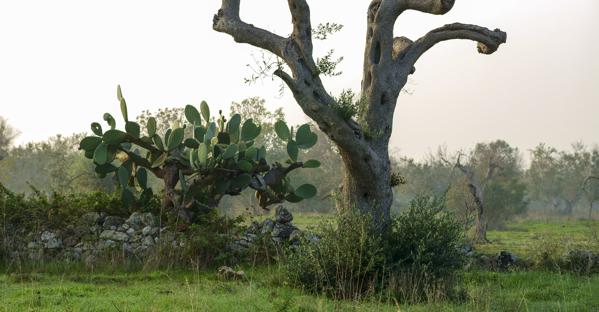Xylella: Coldiretti, 40% of Puglia infected, goodbye to 21 million olive trees
[ad_1]
Xylella has infected over 21 million plants, a massacre of olive trees that has left a ghostly panorama, with over 8 thousand square kilometers of infected territory equal to 40% of the Puglia region. These are the results of Coldiretti’s monitoring of the killer bacterium epidemic spread on the occasion of the day in defense of olive trees at the Bari peasant village, ten years after the arrival of Xylella in Italy.
A veritable perfect storm on farmers without income for ten years, millions of dried olive trees, oil mills sold off in pieces in Greece, Morocco and Tunisia and 5,000 jobs lost in the extra virgin olive oil supply chain and a trend that risks becoming irreversible if adequate tools are not taken to deal with the “culpable disaster” in Salento after years of uselessly lost time and to relaunch the largest Italian green factory which boasted, before the arrival of the bacterium, 60 million olive trees from the Gargano to Capo of Leuca.
Damage to the entire economic system
The damage caused by Xylella does not only concern the availability of Made in Italy oil, but also extends to the environment, the economy and tourism with entire swathes of territory reduced to ghostly expanses of dead trees in an important moment for the recovery of the national economy. A situation that – Coldiretti highlights – weighs on the national production of extra virgin olive oil given that in Puglia, the heart of Italian olive growing, this year – Coldiretti underlines – there is a 40% cut in production due to the Xylella of the changes climate and drought.
Due to the bacterium, 3 out of 4 olives were lost only in the province of Lecce with the collapse of 75% of the production of olive oil. In the province of Taranto there are dry patchy olive trees, with a 15% drop in production in those areas. In the province of Brindisi the harvest has suffered a general reduction of 20-25% due to atmospheric events, with particular reference to the long period of lack of rainfall and high temperatures which have stressed and weakened the olive groves with the continuous advance of Xylella fastidiosa.
Domestic production collapsed
The killer bacterium and climate change – explains Coldiretti – have burned this year a potential equal to 30% of national oil production which collapsed to about 208 million kilos in the 2022/2023 season against 329 million kilos in the previous season.
[ad_2]
Source link











